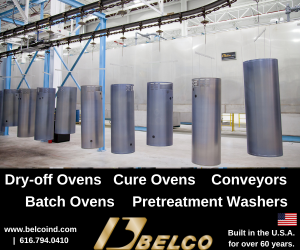Proprietary Grains Remove Metal and Produce Consistent Finishes
Norton’s Vortex belts and wheels use non-woven technology to achieve structured results.
The finishing industry has seen steady growth in non-woven technology, with the results filling some important gaps in the needs of finishers.
“The ability to put a structured finish on the surface of a component is just the tip of the advantage that non-woven technology offers,” says Mike Shappell, an applications engineer with Norton | Saint-Gobain. “While final structured finishes are still a major component in the overall market of non-woven products, we see that metal removal has grown into an important role for this unique product.”
Much of this improvement is due to the effective Norton Vortex grain used in various non-woven belts and wheels. It consists of a non-structured nylon mesh material that suspends the grain in a unique way, unlike the grain on conventional coated abrasive belts. Shappell says this exclusive agglomerated grain allows for a continuation of cut rate and a highly consistent finish.
“For flat parts, non-woven belts are available that can be used for a straight and structured finish,” he says. “With the introduction of the Vortex belts, we have seen the ability of the end user to replace not only greaseless applications, but also improve on the performance of other non-woven belts that do not have the agglomerated technology of the Vortex grain.”
Shappell says the non-woven grain recently helped to improve production at a Midwest finishing operation that was asked to put a structured finish on a ring used on a high-end kitchen appliance. The job required not only a cosmetic finish, but also removal of some medium-sized burrs that occurred during the stamping process.
The finisher started with standard Norton Rapid Prep non-woven belts in medium grit, which Shappell says worked well on a serrated rubber contact wheel to both remove the burr and produce the required finish. But the cost of the belt relative to the number of parts it produced was too high for the small finishing shop, with only 300-400 parts produced per belt. The next belt it tried was coarser and took the count to 500 parts, but the customer was not happy with the finish.
To extend the life of the product by reducing the effect of heat, the shop tried a solid lubricant on the original Rapid Prep belt at the original grit and was able to achieve 600 parts per belt.
“A 100 percent improvement, but still too high a cost per piece,” Shappell says. The finisher then switched to the Vortex version of the Rapid Prep belt with a continuation of solid lube that took it to 1,200 pieces per belt, which was breakeven per the quoted price, but still not good enough to satisfy the customer.
“We then took this same, great-performing Vortex Rapid Prep belt and used a coarse, coated abrasive fiber disc to ‘dress’ the belt after about one-fourth of the life,” he says. “The multi-layer nature of the product made it possible to clean and bring new fibers to the surface, which extended the life of the Vortex belt to around 1,500 pieces per belt.”
Shappell says the shop later switched the solid belt lubricant to a Cool It Lube Liquid version and was able to get at least 1,800 pieces per belt.
Norton | Saint-Gobain | Worcester, Massachusetts | 800-446-1119 | nortonabrasives.com
Read Next
Education Bringing Cleaning to Machining
Debuting new speakers and cleaning technology content during this half-day workshop co-located with IMTS 2024.
Read MoreDelivering Increased Benefits to Greenhouse Films
Baystar's Borstar technology is helping customers deliver better, more reliable production methods to greenhouse agriculture.
Read MoreEpisode 45: An Interview with Chandler Mancuso, MacDermid Envio Solutions
Chandler Mancuso, technical director with MacDermid Envio discusses updating your wastewater treatment system and implementing materials recycling solutions to increase efficiencies, control costs and reduce environmental impact.
Read More












.jpg;maxWidth=300;quality=90)








